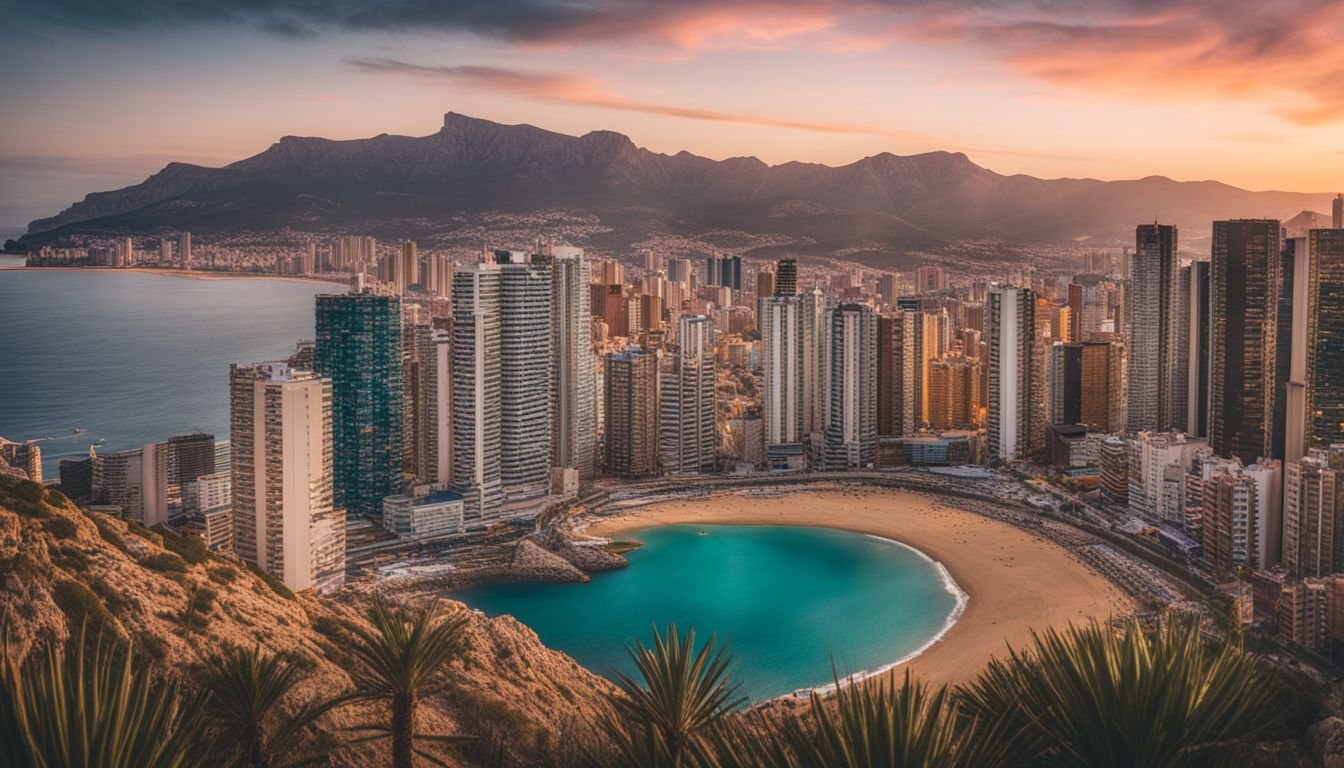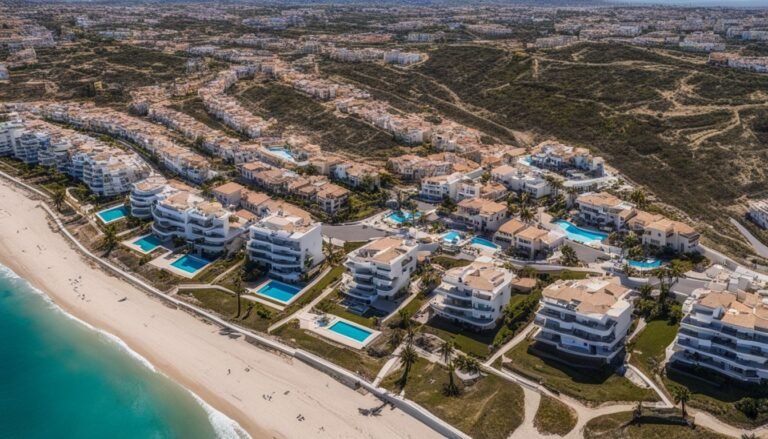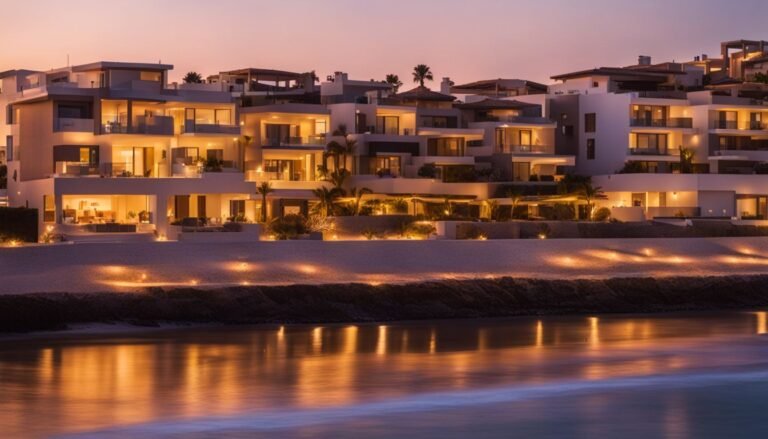Buying Guide: Offer A Comprehensive Guide For Buying Property In Costa Blanca, Including Legal Aspects And Tips For Expats.
Finding the perfect property in Costa Blanca can be challenging, especially for expats. The Spanish property market is on the rise, with prices averaging €1.750 per square meter by early 2023.
This article offers a step-by-step guide to purchasing your dream home in Costa Blanca, covering legal advice and pro tips for foreign buyers. Let’s get started!
The Appeal of the Spanish Property Market

Moving from the basics of purchasing in Costa Blanca to understanding its allure, one can’t help but notice the magnetic pull of the Spanish property market. It’s not just about finding a place to call home; it’s about investing in a location that embodies both cultural richness and economic stability.
The Spanish property scene reflects a significant rebound, with prices averaging €1.750 per square meter by early 2023, signaling strong recovery signals and opportunities for growth.
This upward trend draws investors and families alike, looking for value not only in their properties but also in their quality of life.
Spain ranks as Europe’s top tourist destination, which directly impacts its real estate landscape by increasing demand for rental properties and holiday homes. Foreign ownership is incredibly accessible thanks to policies allowing expats to buy without facing any ownership restrictions or limitations.
Consequently, this openness has led British expats, who make up around 13% of foreign homeowners in Spain, along with many others drawn by affordable costs-of-living and enviable climates, to invest here eagerly.
With approximately 80% of Spaniards owning their properties outright, it articulates an enduring commitment towards homeownership — further underscoring the stable foundation upon which Spain’s property market stands.
Key Locations for Property Investment in Costa Blanca

Costa Blanca boasts several prime locations ripe for property investment, thanks to a combination of rising house prices since 2016 and its appealing landscapes. Alicante city, with its vibrant urban life and proximity to beautiful beaches, stands out as a top choice for investors seeking both growth in capital and rental income potential.
The area’s appeal is heightened by the availability of amenities and its well-established expat community, making it an attractive spot for those looking to buy holiday homes or permanent residences.
Another noteworthy location is Benidorm, famous for its bustling tourist industry and high demand for holiday lets. This city offers investors the chance to tap into the lucrative short-term rental market while also benefiting from long-term capital growth.
With stunning skyscrapers dotting the skyline and some of the most beautiful beaches on the coast, Benidorm combines modernity with natural beauty, ensuring that properties here remain in high demand among both visitors and locals alike.
Understanding the Process of Buying Property in Spain
Understanding the process of buying property in Spain involves obtaining an NIE, finding a bilingual lawyer, opening a Spanish bank account, considering mortgages, and finalizing the purchase at the notary.
For more detailed insights into each step and expert tips, delve deeper into this comprehensive guide.
Obtaining NIE “Número de Identificación de Extranjeros”
To buy property in Spain, foreigners must first get an NIE, which stands for “Número de Identificación de Extranjeros.” This identifier is essential not only for property transactions but also for financial activities and establishing residency rights in the country.
Securing an NIE should be one of the initial steps taken by expats as it paves the way for a smoother property purchase process.
The application for an NIE can be made at Spanish consulates abroad or directly within Spain, offering flexibility to prospective buyers. The process involves submitting a completed application form along with necessary documents like a passport copy and proof of economic activity or reason for requesting an NIE.
Efficient handling of this step is crucial as it significantly impacts subsequent aspects of buying property and settling down in Spain.
Finding a bilingual lawyer
After obtaining your NIE and considering all the necessary steps, finding a bilingual lawyer is essential for navigating the legal requirements of property acquisition in Costa Blanca.
A bilingual lawyer becomes an invaluable asset as they help bridge any language barriers and guide you through Spanish laws and regulations related to purchasing real estate. These legal professionals offer expert advice on potential risks, interpret crucial documents, ensure compliance with all legal requisites, and provide support in understanding local practices.
By consulting a bilingual lawyer proficient in both English and Spanish, you can gain comprehensive insights into property ownership laws while ensuring that every legal aspect of the buying process is meticulously accounted for.
Opening a Spanish Bank account
Foreigners can easily open a Spanish bank account with a financial number (NIE) required for purchasing property in Spain. It’s advisable to ensure that all necessary documents, such as proof of identity and residency, are prepared beforehand.
Once the NIE is secured, expats can approach local banks to open an account and kickstart their property buying process without any unnecessary delays or complications arising from the lack of a bank account.
Mortgage considerations
After opening a Spanish bank account, one crucial consideration when buying property in Costa Blanca is securing a mortgage. It’s important to explore the different types of mortgages available and consider factors such as interest rates, loan terms, and repayment options.
Understanding the potential impact of currency risk on mortgage payments for non-residents is also essential. Additionally, factoring in any associated fees and costs related to obtaining a mortgage will play a significant role in making an informed decision.
Additionally, it’s crucial for buyers to conduct thorough due diligence on prospective lenders and negotiate favorable terms that align with their financial goals. Accessing short-term bridging loans can serve as a viable option for those navigating financing gaps during the initial stages of property ownership.
Signing the “contrato de Reserva”
After addressing the mortgage considerations and obtaining legal expertise, the next step in buying property in Costa Blanca is signing the “contrato de Reserva.” This essential document outlines the terms and conditions of the property purchase, including the agreed price, payment schedule, and any special conditions.
It provides security for both buyer and seller by setting out the agreed terms and preventing the property from being sold to another party during the reservation period. The signing of this contract marks the beginning of formalizing your property acquisition process.
Notably, reviewing and discussing this contract with a real estate lawyer is crucial to ensure favorable terms and compliance with Spanish property laws.
Expert property checks
Engage a qualified surveyor to conduct thorough property inspections. Ensure the foundations, structure, and utilities all meet safety standards. Use professionals to test for mold, pests and assess the overall condition of the property.
Verify land boundaries and rights with a competent legal professional familiar with local regulations.
Conduct background checks on any potential hidden issues or liabilities that could impact your property investment. Hire experts to review any pending permits or zoning changes in the area that could affect future plans for your property purchase.
Mortgage confirmation
Foreigners looking to secure a mortgage for purchasing property in Spain must obtain a financial number or NIE (Número de Identificación de Extranjeros) as it is often required for mortgage confirmation.
It is advisable to consult with a legal professional to ensure compliance with Spanish laws when obtaining a mortgage, as they can guide expats through the process and address any potential issues that may arise.
Additionally, working with an experienced real estate lawyer is crucial for ensuring that the mortgage details are accurate and aligned with Spanish regulations, safeguarding the purchase process.
Signing the “contrato de Arras”
When signing the “contrato de Arras” in Spain, buyers typically pay a deposit to secure the property. This agreement outlines a timeframe for completing the purchase, including final payment and transfer of ownership.
The contrato de Arras is crucial as it provides security for both the buyer and seller throughout the transaction. It’s advisable to engage a real estate lawyer who can review and provide guidance on this legal aspect to safeguard the buyer’s interests.
Next: “Finalizing the purchase at the Notary”
Finalizing the purchase at the Notary
Once all the necessary checks have been completed, it is time to finalize the purchase at the Notary. The notary will oversee the formal signing of the property sale contract and ensure that all legal requirements are met.
This step involves signing the escritura de compraventa (property deed) in front of a notary public, who then records it with Spain’s land registry office. It is crucial to ensure clarity on any outstanding issues and clarify terms during this final stage.
Before proceeding with this significant step, consulting a real estate lawyer can provide added assurance that everything is in order and reduce potential risks associated with purchasing property in Costa Blanca or any part of Spain.
Financing Your Property Purchase in Costa Blanca
To finance your property purchase in Costa Blanca, you have several options available. Traditional methods such as securing a mortgage from local or international banks can provide long-term financing with favorable interest rates.
If you require flexibility and speed, alternative sources like bridging loans are also viable options. These loans offer short-term funding to bridge the gap between buying a new property and selling an existing one.
Considering that the cost of buying property in Spain averages around 15% of the property’s value, including taxes, understanding your financing options is crucial.
Investments, Spanish mortgage providers
Costs Associated with Buying Property in Costa Blanca
After exploring how to finance your property purchase in Costa Blanca, it’s crucial to understand the variety of costs involved in the transaction. These expenses go beyond the purchase price and can significantly affect your overall investment. Let’s break down these costs.
| Type of Cost | Description | Approximate Percentage of Property Value |
|---|---|---|
| Transfer Tax (ITP) | Applies to resale properties, varies by region | 8-11% |
| VAT (IVA) & Stamp Duty | Applicable to new-build homes; VAT is charged on purchase price, Stamp Duty on the value of the land | VAT: 10%, Stamp Duty: 1.5% |
| Notary Fees | For facilitating the transaction and legalizing documents | 0.5-1% |
| Legal Fees | Paid to your lawyer for legal advice and services | 1-2% |
| Estate Agent Fees | For services in finding and securing the property. Typically covered by the seller in Spain. | N/A to buyer |
| Land Registry Fees | For registering the property in your name | 0.4-0.5% |
| Mortgage Costs | If financing the purchase, includes arrangement fees, valuation fees, and mortgage stamp duty | Varies |
| Banking Costs | For money transfers, checks, and opening an account, if applicable | Varies |
These costs ensure compliance with legal standards and secure the property in your name. Always budget for these additional expenses, as they will impact the total cost of your investment in Costa Blanca.
Finding Your Ideal Property in Costa Blanca
Consider using local property hunters to assist you in locating the perfect property, allowing you to compare and evaluate options easily. Read on for more tips and guidance!
Using local property hunters
Local property hunters in Costa Blanca offer expert assistance in finding the perfect property. They can guide potential buyers with comprehensive knowledge of the local market, legal requirements, and tips for expats.
These professionals play a crucial role by providing contact information for expert assistance in property hunting and facilitate the process of purchasing a home in Spain. Furthermore, they may also provide valuable guidance on short-term bridging loans, making them an essential resource for anyone looking to invest in real estate within Costa Blanca or other popular locations like Portugal, France, Mallorca, Italy, and Tenerife.
These property hunters simplify the complex process of buying a property by offering practical steps and insights based on their experience and understanding of the local housing market dynamics.
Evaluating and comparing properties
To evaluate and compare properties in Costa Blanca, consider key factors such as location, accessibility, amenities, and potential for rental income. Look for properties with high energy efficiency and good potential for resale value.
Take into account the local market trends and consult a bilingual real estate agent who has expertise in the specific areas you are interested in. Additionally, it’s essential to conduct thorough property checks including legal, financial, and structural assessments to ensure that your investment is secure.
With these considerations in mind, let’s delve into the importance of hiring a legal adviser when buying property in Costa Blanca.
Importance of Hiring a Legal Adviser
Hiring a legal adviser is essential for purchasing property in Costa Blanca. Working with a local real estate lawyer and professionals can help navigate the complexities of Spanish property laws and ensure that the purchase process is watertight.
This helps to avoid any potential issues that may arise, providing peace of mind for foreign investors and expats exploring real estate investment opportunities in Spain.
It’s advisable to engage a real estate lawyer to oversee the property purchase, as they can provide valuable guidance on legal checks, title deeds, and compliance with local regulations.
Seeking professional assistance from legal advisers is crucial in safeguarding the investment and ensuring a smooth property acquisition process within Costa Blanca’s dynamic real estate market.
Considerations for Buying a New-Build Home in Costa Blanca
When buying a new-build home in Costa Blanca, it’s crucial to engage with reputable developers who have a proven track record of delivering quality properties. Choosing an established developer ensures that the construction complies with local regulations and standards, providing peace of mind throughout the process.
Furthermore, understanding the payment structure and timeline for completion is essential to avoid any financial or timing surprises.
Considering the benefits offered by Spain for purchasing a new-build property, including affordable labor costs and high-quality materials, potential buyers should carefully evaluate developers’ reputation and previous projects.
This consideration helps mitigate risks and assures buyers of acquiring top-notch products in this enticing real estate market.
Rental Opportunities in Costa Blanca: Discussing Long-Term Rental Options, Best Areas for Rentals, and Tips for Renting
Long-term rental options in Costa Blanca offer expats and foreigners an excellent opportunity to immerse themselves in the vibrant Spanish lifestyle. The region is renowned for its diverse rental options, catering to different preferences and budgets.
Whether it’s a beachfront apartment or a tranquil villa nestled in the hills, Costa Blanca has something for everyone. Additionally, areas such as Alicante, Benidorm, Calpe, and Denia are highly sought after for their long-term rental properties due to their convenient amenities and picturesque surroundings.
When considering long-term rentals in Costa Blanca, potential renters should take into account factors such as local income levels, rental prices across various regions within Costa Blanca, as well as the general economic situation.
This can provide insight into the affordability of different areas and assist in making informed decisions about long-term rentals. Moreover, working with local professionals and real estate experts can significantly streamline the process of finding the ideal rental property while ensuring adherence to legal considerations like rental contracts and regulations that may vary from one area to another within Costa Blanca.
Moving into Your New Property in Costa Blanca
Moving into your new property in Costa Blanca involves understanding the cost of owning a home and following a checklist for new property owners. To explore more about settling into your new home, continue reading the comprehensive guide.
Checklist for new property owners
Create a budget to cover essential expenses such as property taxes, home insurance, and utility bills. Get acquainted with local service providers for any necessary repairs or maintenance.
Familiarize yourself with the rules and regulations of your residential community to ensure compliance. Plan regular inspections and preventive maintenance to protect the value of your investment.
After making this checklist for new property owners, let’s explore the financial aspects of owning a property in Costa Blanca.
Understanding the cost of owning a home
Owning a home in Costa Blanca involves various ongoing expenses. This includes property taxes, insurance, maintenance, and utilities. It’s crucial to budget for these costs to ensure financial stability as a homeowner.
Seeking local advice can offer valuable insight into cost expectations and potential financial risks in the Costa Blanca market.
When purchasing a property in Costa Blanca, it is essential to consider not only the initial purchase price but also the long-term financial commitment of homeownership. Regularly evaluating and planning for these ongoing expenses will help ensure a smooth transition into homeownership in this beautiful region.
Can Expats Buy Property in Costa Blanca?
Expats can buy property in Costa Blanca, as Spain allows foreigners to own real estate. However, they need to follow certain legal procedures and obtain a NIE (Número de Identificación de Extranjeros) for property transactions.
It’s important to consult with a bilingual lawyer who specializes in real estate law to ensure compliance with Spanish regulations and understand the process thoroughly.
The Valencian Community, including the popular region of Costa Blanca, is known for its appeal among expat property buyers. Expats looking to invest or settle in this area should consider seeking professional legal guidance before making any property purchases.
FAQs for Buying Property in Costa Blanca
What taxes are due when buying a property in Costa Blanca? How long does the buying process take?
Is it a good idea to buy property in Costa Blanca?
Buying property in Costa Blanca can be a great idea due to the region’s lower cost of living and desirable lifestyle for holiday homes, retirement, or investment. The appeal of the Spanish property market and its potential for rental opportunities make it an attractive choice for property investors.
Additionally, considering the region’s offering of a desirable lifestyle and relatively affordable cost of living compared to other European destinations, purchasing property in Costa Blanca offers an excellent opportunity for those seeking a sound real estate investment with long-term benefits while enjoying a high quality of life.
What taxes are due when buying a property?
Before delving into the intricacies of property taxes in Costa Blanca, it’s important to note that there are several costs associated with buying property in Spain, including various taxes.
When purchasing a property in Costa Blanca, buyers need to consider the Transfer Tax (Impuesto sobre Transmisiones Patrimoniales) which ranges from 6% to 10% of the purchase price depending on the region.
Additionally, Value Added Tax (VAT), known as IVA in Spain, applies to new properties and stands at 10% of the purchase price. For those buying land for construction or commercial purposes, a Land Registry tax is also payable.
How long does the buying process take?
The buying process for property in Costa Blanca typically takes an average of 3-4 months to complete. However, this timeline can vary based on factors such as transaction complexity, legal requirements, and the efficiency of all involved parties.
It’s vital for buyers to anticipate potential delays and allow extra time when planning their property purchase due to these considerations.
Considering that the purchasing process requires coordination among various entities and adherence to legal procedures, it is advisable for prospective buyers to be prepared for a timeframe ranging from 3-4 months on average and possibly longer in some cases.
Conclusion
Congratulations on navigating through this comprehensive guide! You are now equipped with the essential knowledge needed for purchasing property in Costa Blanca. Remember to seek professional guidance and conduct thorough research before making any decisions.
Now, it’s time to make your dream of owning a property in this beautiful region a reality. Good luck!
For more detailed information on maximizing your investment with long-term rentals, visit our comprehensive guide on rental opportunities in Costa Blanca.
FAQs
1. What is a Golden Visa and how can it help me buy property in Spain?
A Golden Visa allows investors, including those buying real estate like homes in Costa Blanca, to live in Spain. By investing a certain amount of money, you can get this visa, making your move smoother.
2. Should I talk to an estate agent when looking for property in Costa Blanca?
Yes, talking to experienced estate agents can guide you through the process of finding and buying your dream home. They know the local market well and can offer valuable advice.
3. How did the global financial crisis affect property values in Spain?
The global financial crisis led to a downturn in property values across Spain, including popular areas like Costa Blanca. However, prices have been recovering, offering opportunities for buyers.
4. What should I know about mortgages if I want to buy a house in Costa Blanca?
If you’re considering getting a mortgage in Spain, understand terms like LTV ratio (Loan-to-Value) and compare offers from different mortgage lenders with the help of a mortgage broker.
5. Can expats face challenges with legal aspects when buying property?
Yes, expats might find some legal processes challenging such as land registration or understanding capital gains tax rules. Hiring an “abogado” (lawyer) who speaks both English and Spanish helps manage these issues effectively.
6. How do exchange rates impact my real estate investment in places like Alicante or Marbella?
Exchange rates directly affect your investment’s cost and potential return when buying property overseas. It’s wise to monitor them closely or consult with financial experts to maximize your financial security.







